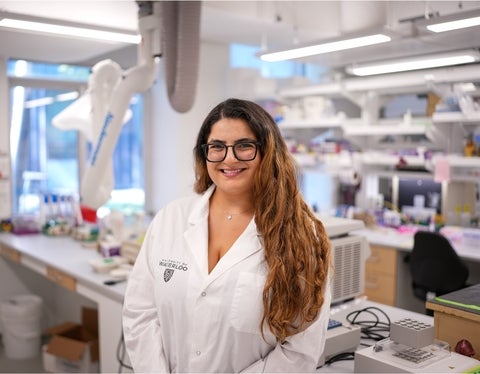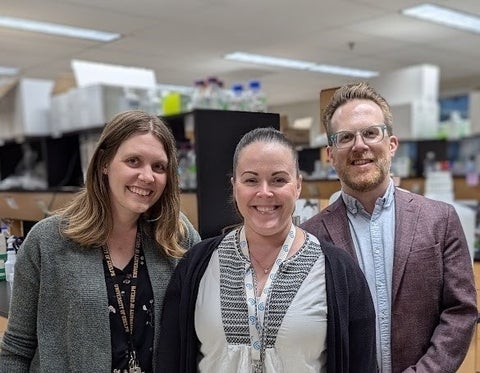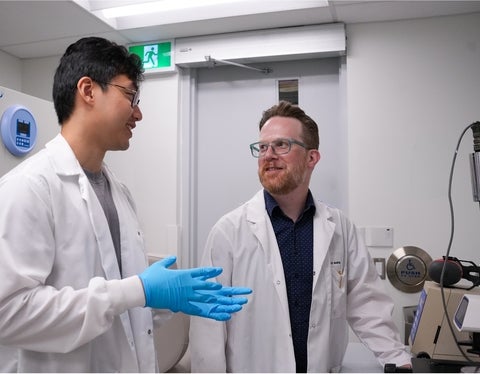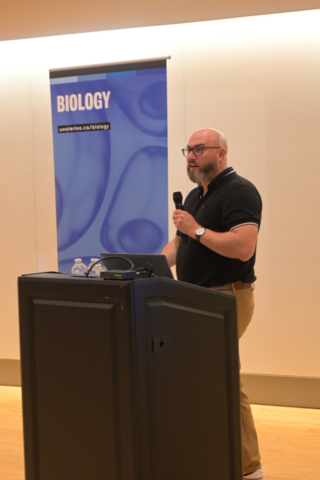
Health and Biomedical Sciences
Healthy Communities Begin at the Cellular Level
Through studying disease prevention to developing therapeutic advances, our researchers, students, and alumni are poised to transform the future of healthcare by finding creative solutions to the complex problems facing humanity today. Our comprehensive approach to biomedical research and diagnostics ensures that the latest breakthroughs in scientific progress are felt broadly, forging a path for a healthier, more prosperous future.
Health Leaders and Researchers in Waterloo Science
Read more about:
Dr. Dale Martin
Science Professor, Department of Biology
Dr. Dale Martin is at the forefront of cutting-edge brain research, unlocking the mysteries of devastating neurodegenerative diseases like Huntington disease (HD) and amyotrophic lateral sclerosis (ALS). His lab delves deep into the cellular pathways and molecular mechanisms driving these disorders, aiming to unravel their underlying causes and cellular progression.
By focusing on repairing the protein clearance pathway of autophagy and harnessing the power of gene silencing, Dr. Martin's work paves the way for groundbreaking future therapies. His research not only holds the potential to transform treatments for ALS and HD but also sparks vital multidisciplinary collaborations that could redefine the fight against neurodegeneration.
By mapping the molecular mechanisms of cell death in different neurodegenerative disease such as Huntington Disease and amyotrophic lateral sclerosis, we hope to pinpoint cellular processes to develop broad therapeutic targets for neurodegeneration. I'm excited to train the next generation of researchers who will contribute to finding cures for these devastating diseases.

Success stories from Dale Martin's lab:

Leaving an impact on humanity through health research
Yasmeen Alshehabi, BSc ’23 (Biomedical Sciences), and now a Master's student in Dr. Dale Martin's lab reflects on her choice to pursue research, and the impact she is making to tackle complex biological challenges and offer hope to patients and families whose lives are affected by devastating neurodegenerative diseases.

The Huntington Society of Canada funds a new collaborative study between University of Waterloo and the University of Guelph.
This $150,000 funding will allow Dr. Martin and his collaborators to explore the role of the protein dual leucine zipper kinase (DLK) in Huntington disease (HD) using genetic approaches to lower DLK in HD models.

Dr. Dale Martin named a Future Leader in Canadian Brain Research.
Brain Canada’s 2023 Future Leaders in Canadian Brain Research program supports emerging brain researchers working to develop cures for anything from depression to Alzheimer’s disease to brain injury. This grant will allow Martin’s team to optimize their nanoparticles for the treatment of a rare cluster of diseases called multisystem proteinopathy, and will also have a broader impact on the health of people living with other neurodegenerative diseases.

Professor Dale Martin receives grant to explore new therapeutic targets in ALS research.
This $125,000 grant is dedicated to advancing amyotrophic lateral sclerosis (ALS) research. “These research funds will help us delve deeper into some of the earliest molecular mechanisms that go awry in ALS and set the foundation for continuing ALS research in the NeurdyPhagy lab," says Martin.
Dr. Travis Craddock
Science Professor, Department of Biology
Dr. Travis Craddock’s research spans the divide between the microscopic cellular level and the infinitesimally small quantum theory, in search of discoveries with significant and meaningful impact on neurological diseases. These diseases, like Alzheimer’s disease and Parkinson’s disease, have been identified as one of the most serious health issues facing society today.
Using tools from quantum biology — the study of biological processes and biochemistry at the quantum level, Dr. Craddock is modeling sub-neural structures in the brain to advance knowledge and develop new approaches to diagnosing and treating illnesses, improving the quality of life for millions of people worldwide.


Dr. Craddock aims to find new insights into our scientific understanding and potential treatments of debilitating neuroinflammatory diseases, including Alzheimer’s disease and Parkinson’s disease. His research explores the causes of neurodegeneration using quantum neurobiology—using concepts from quantum mechanics to address questions in biology that are not yet fully understood.
Read more about his efforts in the news story The Brain, Quantum Physics and Neuroinflammatory Diseases.
What is quantum neurobiology?
Hear Dr. Travis Craddock explain what this area is, and how he's using it to shed light on neuroinflammatory illnesses.
Yvonne Stevens
Science Alumni
BSc '95 (Biochemistry), MSc '98 (Biology)
As Director, Quality Control at Lyell Immunopharma, Yvonne Stevens is at the forefront of developing immunotherapies for the treatment of solid tumor and blood cancers for patients for whom existing treatments have failed. These clinical phase therapies involve genetic reprogramming of the patient’s own T cells to fight their cancers and provide a less invasive, more cancer cells targeted, option to traditional chemo and radiotherapies. These “arm-to- arm” therapies collect cells from the patient’s arm at a clinical site, which are sent to the manufacturing facility for engineering and growth, before being returned and infused back into the patient’s arm. These immunotherapies are designed to maintain cancer cell-killing, with engineered cells capable of self-renewing and persisting, to drive durable treatments.
Previously, Yvonne worked on the development and manufacturing of FDA- approved point of care tests used in the detection and diagnosis of infectious diseases such as Dengue and West Nile and also in determining the efficacy of HIV therapies.

Read more about Yvonne's path from growing up deciding she wanted to be a scientist, to her time at Waterloo, and beyond into the workplace in our alumni profile Leading the charge in treating cancer.
We hold the key to unlock a healthier future, where we are training the next generation of health care professionals, fostering cutting-edge diagnosis and treatment research, and driving meaningful change for vibrant living, longevity, healthy aging and disease prevention.
With your support, we will make a difference. Together, we are redefining what is possible.





